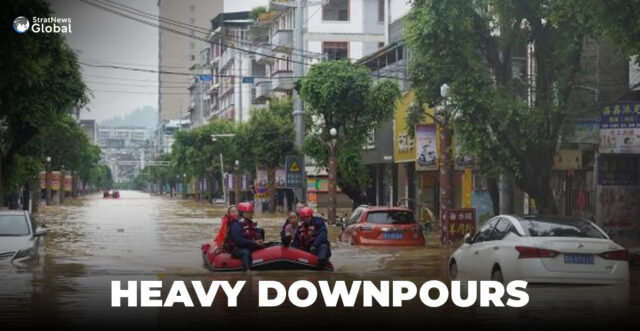China’s southwestern Guizhou province was hit by another round of heavy rainfall on Saturday, leaving the riverside city of Rongjiang partially submerged once again. It marked the second major flooding in the area this week, forcing residents to evacuate to safer, higher ground.
Located at the confluence of three rivers and home to 300,000 residents, Rongjiang was inundated earlier this week by record downpours that left six dead and forced more than 80,000 people to flee their homes. The amount of rain that fell over 72 hours was double the city’s average for June.
In response to the new round of flooding, authorities raised the city’s flood emergency response level to the highest level on Saturday.
Alarming Water Levels
The benchmark hydrological station on one of the rivers estimated that the peak water level would hit 253.50 metres (832 ft) at around 5 p.m. (0900 GMT), exceeding the safety threshold by 2 metres, state broadcaster CCTV said.
More than 40,000 residents in Rongjiang had been urgently evacuated as of 6 p.m. (1000 GMT) on Saturday, according to the state broadcaster.
Earlier this week, the peak water level reached 256.7 metres, the highest since 1954, the Guizhou provincial government said in a statement on Friday, blaming “the extreme climate” for the flooding.
The floods in southwest China are set to hit local economies.
Rongjiang was removed from the national poverty list in 2020. It then saw an unexpected tourism boom after a local soccer league nicknamed “Village Super League” became a social media sensation, attracting thousands of fans and tourists. On Tuesday, the soccer pitch was up to seven metres under water.
China has battled with summer floods for millennia, but some scientists say climate change is resulting in heavier and more frequent rain. Massive flooding could set off unforeseen “black swan” events with dire consequences, such as dam collapses, Chinese officials say.
In southern China over the past two days, 13 major rivers in Yunnan, Guizhou, Guangxi and Hainan were hit by storms and had risen above their warning levels, CCTV reported, citing the Ministry of Water Resources on Saturday.
(With inputs from Reuters)





